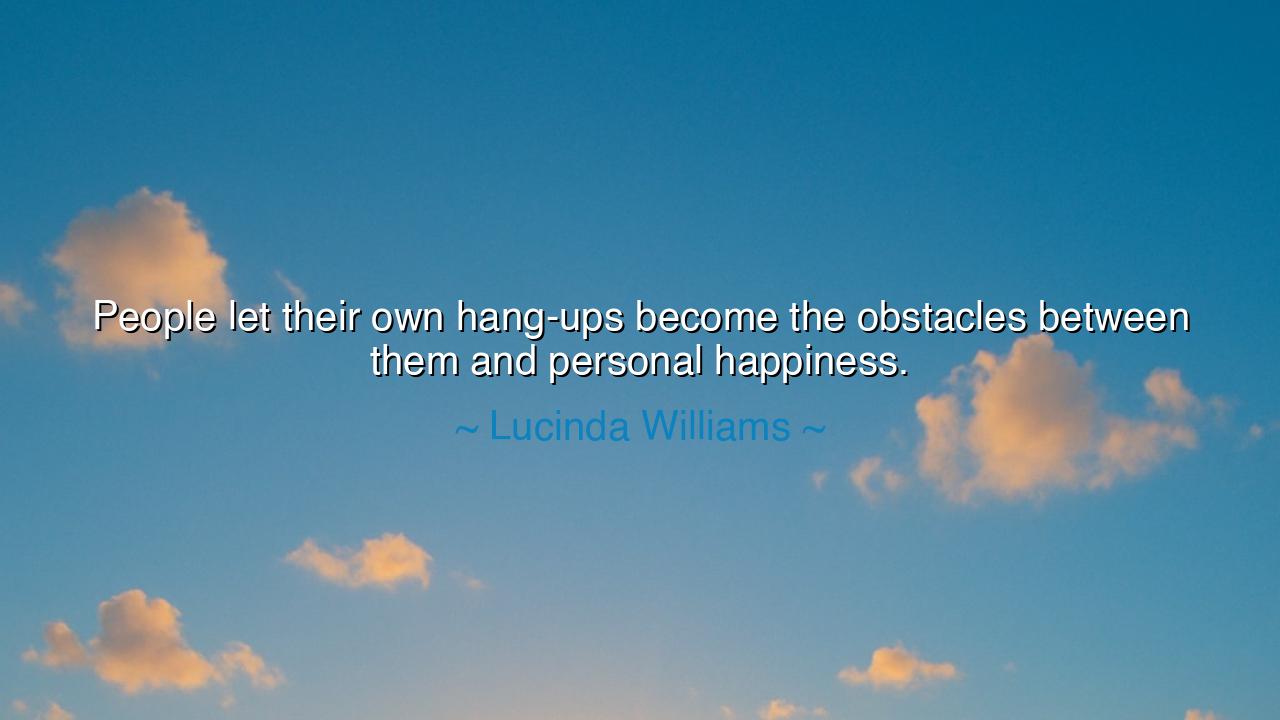
People let their own hang-ups become the obstacles between them
People let their own hang-ups become the obstacles between them and personal happiness.






The poet and singer Lucinda Williams, whose music speaks to the raw, unvarnished truths of the human heart, once said: “People let their own hang-ups become the obstacles between them and personal happiness.” In this single line, she unveils a wisdom both simple and profound — that often, the greatest chains that bind us are not forged by the world, but by our own hands. Her words echo like a melody for the soul: a call to recognize that self-imposed barriers, born of fear, guilt, pride, or pain, stand between us and the joy that life offers so freely.
To understand this truth, we must first understand what hang-ups truly are. They are the ghosts of past mistakes, the echoes of old wounds, the burdens of self-doubt that whisper, “You cannot, you do not deserve, you are not enough.” These inner walls are built not from stone, but from memory and emotion — yet they are strong enough to block the light of happiness. Lucinda Williams, whose songs often weave sorrow and redemption together, speaks as one who has lived this truth. Her art has always been about breaking through those internal barriers — through heartbreak, through loss, through the long journey of forgiving oneself. She teaches that happiness does not wait outside of us; it is within us, hidden beneath the rubble of our own fears.
The ancients, too, knew this wisdom well. The Stoic philosopher Epictetus once said, “Men are disturbed not by things, but by the view they take of them.” This means that suffering often arises not from what happens to us, but from how we interpret and carry those experiences. When Williams speaks of hang-ups, she refers to these false interpretations — the self-limiting beliefs that tell us we are trapped, when in truth, the cage has no lock. To be free, we must learn to look inward, to recognize which burdens are real and which are illusions born of pride or shame. True freedom of the soul begins when we confront ourselves without judgment, and choose to release what no longer serves us.
History offers us countless examples of those who have overcome their own inner barriers to find joy and meaning. Consider Nelson Mandela, who spent twenty-seven years imprisoned — not only within walls of stone, but within the temptation of bitterness. Yet he refused to let hatred become his hang-up, his obstacle. When he emerged from his cell, he said, “As I walked out the door toward my freedom, I knew if I didn’t leave my bitterness and hatred behind, I’d still be in prison.” Mandela understood the very essence of Williams’ words — that personal happiness requires not the absence of suffering, but the courage to let go of the things that chain the heart.
And so, we learn that the path to happiness is not one of conquest, but of release. Many people seek joy in wealth, status, or approval, yet remain restless and unsatisfied because they carry their burdens wherever they go. You cannot fill a cup already full of fear; you cannot grasp happiness with hands clenched around resentment. To find peace, one must open the heart and let go — of old grudges, impossible expectations, and the belief that perfection is required for contentment. Happiness is not perfection; it is acceptance. It is the quiet strength to say, “This is who I am, and that is enough.”
Lucinda Williams’ life and music echo this message again and again: that to be happy, one must be authentic. The world may wound you, but it is your own hesitation to heal that prolongs the pain. Your hang-ups — those doubts, those insecurities, those memories you replay — are not truths, but stories you have told yourself. Change the story, and you change your life. This is not easy work; it requires courage to face what is within. But the reward is immeasurable — a peace no external thing can buy, a freedom that no one can take away.
So, my child, take this teaching to heart: do not let your own fears steal the joy that was meant for you. The obstacles you face may seem vast, but the greatest one is often invisible — the barrier within. Be gentle with yourself, yet firm in your resolve to move forward. Forgive the past. Release the shame. Speak to yourself with kindness. For happiness is not something you must chase; it is something you uncover, once you remove the shadows you have cast upon it. And when you do, as Lucinda Williams so wisely knew, you will find that life’s beauty was never far away — it was waiting within you all along, beyond your hang-ups, beyond your doubts, shining quietly in the open sky of your own heart.






AAdministratorAdministrator
Welcome, honored guests. Please leave a comment, we will respond soon